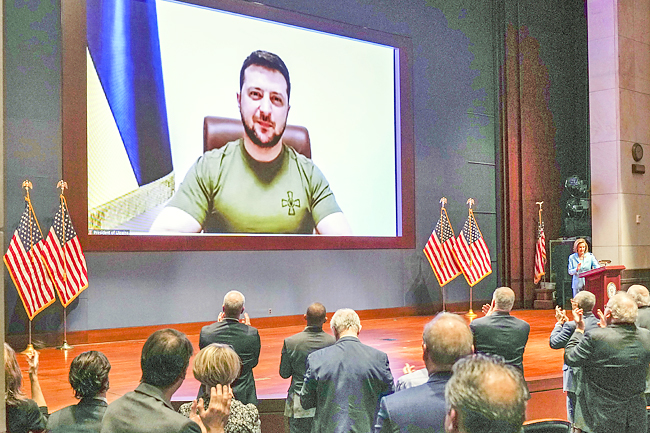NEW YORK (AP) – Ukraine, which has waged a staunch defence against Russian invasion, said it pioneered a new source of financial support: People around the world who have donated millions of dollars directly to its war effort via cryptocurrencies such as bitcoin.
Since February 26, when Ukrainian officials began tweeting calls for cryptocurrency donations, the Ukrainian government said it has taken in almost USD67 million of its USD200 million goal as of Saturday. “Today, crypto is playing a significant role in Ukraine’s defence,” the country’s deputy minister for digital transformation Alex Bornyakov wrote on the nation’s donation website.
Ukraine has spent about USD34 million of the funds received as of last week, converting about 80 per cent to traditional currencies and using the remainder with merchants that already accept cryptocurrencies, Bornyakov said in response to emailed questions.
The funds raised in cryptocurrency are a just small part of the overall donations that Ukraine has received. After raising as much as USD12 million on March 2, cryptocurrency donations have tapered off although boosters said the unexpected initial surge may inspire other efforts to solicit cryptocurrencies for humanitarian or defensive purposes. Officials have said that the speed with which they can use cryptocurrency donations has made them useful.
The downside of that ease of transfer, of course, is that cryptocurrencies continue to be a magnet for scams and are the currency of choice for criminal networks. Last Tuesday, European Central Bank head Christine Lagarde warned that crypto assets “are being used as a way to try to circumvent the sanctions” against Russia, but didn’t provide details beyond noting that global transfers of rubles into cryptocurrency are rising sharply in volume.
Michael Chobanian, the founder of a Ukrainian cryptocurrency exchange, is one of several people helping the Ukrainian government manage the donations through an informal agreement, Bornyakov confirmed.
“We are buying so much stuff that is saving lives every single day and also are stopping the aggression, so it’s a beginning of the new world,” Chobanian said in a voice message sent via the app Telegram.
Chobanian said he was not receiving payment for his work but acknowledged that some of the funds are being converted through his cryptocurrency exchange Kuna.

“It’s certainly a first,” said Bennett Tomlin, who investigates cryptocurrency scams and hosts the podcast Crypto Critic’s Corner. “We’ve never seen a sovereign nation fund their defence efforts in crypto before. It does prove out a lot of the crypto argument.”
That argument is that cryptocurrencies allow for the unfettered sending and receiving of value across borders via networks that can’t easily be censored or shut down because there is no single entity in charge. Proponents also argue that cryptocurrency doesn’t require users to trust financial institutions because the system is managed by code that anyone can inspect and transactions are written indelibly into distributed public digital ledgers known as blockchains.
The donations to Ukraine are a stress test of sorts for those claims, some of which have fared better than others.
For example, services like cryptocurrency exchanges do act as gatekeepers in part because many are required to collect identifying information about the people who use their services. Two large cryptocurrency exchanges, Binance and CoinBase, took action to limit use of some of their services in Russia earlier this month, although they have not withdrawn entirely.
The publicity around Ukraine’s call for donations also attracted scammers who tried to capitalise on the good will of donors. Hilary Allen, a professor at American University’s law school who has written a book about the risks cryptocurrencies pose to financial systems, said anyone who donates should carefully look at all the actors involved.
“Who is receiving the crypto? Who will be converting the crypto? You need to be thinking about them the same way you’d be thinking about any other charity or non-profit you are donating to because they are intermediaries in just the same way,” Allen said.
Many of the donations to Ukraine’s accounts are verifiable on public tools that track cryptocurrency transactions – as are the transfers that are made out of the accounts Ukraine controls.
Another challenge presented by accepting cryptocurrency donations is the potential for people to send tainted assets obtained through crime or scams, Ukrainian cryptocurrency attorney Artem Afian said.
Even if some of the funds donated were gained through illicit activity, he said, “I think comparing the risks and benefits for Ukraine now – Ukraine is using every penny, every chance to support people, to support the army, so this is not a time when Ukraine can choose a lot.”
In total, cryptocurrency donations so far equal around one per cent of Ukraine’s annual pre-war defence budget, according to a Congressional Research Service report updated in January. Ukraine’s government is also receiving aid through multiple other channels, although not all of those flow directly to the government.








